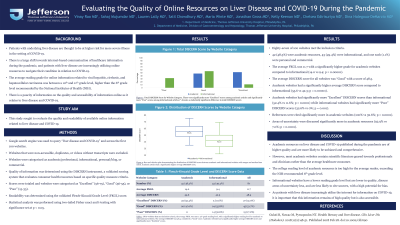Back


Poster Session E - Tuesday Afternoon
Category: Liver
E0466 - Evaluating the Quality of Online Resources on Liver Disease and COVID-19 During the Pandemic
Tuesday, October 25, 2022
3:00 PM – 5:00 PM ET
Location: Crown Ballroom

Has Audio

Vinay Rao, MD
Thomas Jefferson University Hospital
Philadelphia, PA
Presenting Author(s)
Vinay Rao, MD1, Lauren T. Lally, MD1, Sahaj Mujumdar, MD1, Salil Chowdhury, MD1, Maria Winte, MD1, Jonathan Gross, MD1, Kelly Keenan, MD2, Chelsea Edirisuriya, MD1, Dina Halegoua-DeMarzio, MD1
1Thomas Jefferson University Hospital, Philadelphia, PA; 2Thomas Jefferson University Hospital, Ballwin, PA
Introduction: Patients with underlying liver disease are thought to be at higher risk for severe illness in the setting of COVID-19. These patients are likely to use online resources for guidance on how to navigate the COVID-19 pandemic, particularly given the shift in focus to internet-based communication during this time. This study sought to evaluate the quality and readability of online information related to liver disease and COVID-19.
Methods: Google search engine was used to query “liver disease and COVID-19” to access the first 100 websites. Websites that were non-accessible, duplicates or videos without transcripts were excluded. Websites were categorized as academic/professional, informational, personal/blog or commercial. Quality of information was determined using the validated DISCERN score. Readability was determined using the validated Flesch-Kincaid Grade Level (FKGL) calculation. Acknowledgment of areas of uncertainty and references cited were noted. Statistical analysis was performed using two-tailed Fisher exact and t-testing with significance set at p< 0.05.
Results: Eighty-seven of 100 websites met the inclusion criteria. 42(48.3%) were academic, 43(49.4%) informational and one each (1.1%) personal and commercial. The average FKGL was 11.7, and academic websites had a significantly higher grade level compared to informational (14.0 vs 9.4; p=0.00001). The average DISCERN score for all websites was “Good” with a score of 48.5. Academic websites had a significantly higher DISCERN compared to informational (55.6 vs 42.3; p=0.00001). Academic websites had significantly more “Excellent” scores compared to informational (52.4% vs 11.6%; p=0.0001) and informational websites had significantly more “Poor” scores (32.6% vs 0%; p=0.001). Cited references (100% vs 32.6%; p=0.0001) and areas of uncertainty (92.9% vs 7.0%; p=0.0001) were addressed more so in academic websites.
Discussion: Our study shows that academic resources on liver disease and COVID-19 published during the pandemic are of higher quality and are more likely to be unbiased and comprehensive, but that most are scientific literature geared towards professionals. The academic reading level is also too high for the average reader and while informational websites have a lower grade level, they are also of lower quality. As patients with liver disease seek resources on COVID-19 online, it is important that information remains of high quality but is also accessible.

Disclosures:
Vinay Rao, MD1, Lauren T. Lally, MD1, Sahaj Mujumdar, MD1, Salil Chowdhury, MD1, Maria Winte, MD1, Jonathan Gross, MD1, Kelly Keenan, MD2, Chelsea Edirisuriya, MD1, Dina Halegoua-DeMarzio, MD1. E0466 - Evaluating the Quality of Online Resources on Liver Disease and COVID-19 During the Pandemic, ACG 2022 Annual Scientific Meeting Abstracts. Charlotte, NC: American College of Gastroenterology.
1Thomas Jefferson University Hospital, Philadelphia, PA; 2Thomas Jefferson University Hospital, Ballwin, PA
Introduction: Patients with underlying liver disease are thought to be at higher risk for severe illness in the setting of COVID-19. These patients are likely to use online resources for guidance on how to navigate the COVID-19 pandemic, particularly given the shift in focus to internet-based communication during this time. This study sought to evaluate the quality and readability of online information related to liver disease and COVID-19.
Methods: Google search engine was used to query “liver disease and COVID-19” to access the first 100 websites. Websites that were non-accessible, duplicates or videos without transcripts were excluded. Websites were categorized as academic/professional, informational, personal/blog or commercial. Quality of information was determined using the validated DISCERN score. Readability was determined using the validated Flesch-Kincaid Grade Level (FKGL) calculation. Acknowledgment of areas of uncertainty and references cited were noted. Statistical analysis was performed using two-tailed Fisher exact and t-testing with significance set at p< 0.05.
Results: Eighty-seven of 100 websites met the inclusion criteria. 42(48.3%) were academic, 43(49.4%) informational and one each (1.1%) personal and commercial. The average FKGL was 11.7, and academic websites had a significantly higher grade level compared to informational (14.0 vs 9.4; p=0.00001). The average DISCERN score for all websites was “Good” with a score of 48.5. Academic websites had a significantly higher DISCERN compared to informational (55.6 vs 42.3; p=0.00001). Academic websites had significantly more “Excellent” scores compared to informational (52.4% vs 11.6%; p=0.0001) and informational websites had significantly more “Poor” scores (32.6% vs 0%; p=0.001). Cited references (100% vs 32.6%; p=0.0001) and areas of uncertainty (92.9% vs 7.0%; p=0.0001) were addressed more so in academic websites.
Discussion: Our study shows that academic resources on liver disease and COVID-19 published during the pandemic are of higher quality and are more likely to be unbiased and comprehensive, but that most are scientific literature geared towards professionals. The academic reading level is also too high for the average reader and while informational websites have a lower grade level, they are also of lower quality. As patients with liver disease seek resources on COVID-19 online, it is important that information remains of high quality but is also accessible.

Figure: Figure 1: Total DISCERN Score by Website Category (* denotes a statistically significant difference in total DISCERN score [Poor, Good, Excellent] among website categories)
Disclosures:
Vinay Rao indicated no relevant financial relationships.
Lauren Lally indicated no relevant financial relationships.
Sahaj Mujumdar indicated no relevant financial relationships.
Salil Chowdhury indicated no relevant financial relationships.
Maria Winte indicated no relevant financial relationships.
Jonathan Gross indicated no relevant financial relationships.
Kelly Keenan indicated no relevant financial relationships.
Chelsea Edirisuriya indicated no relevant financial relationships.
Dina Halegoua-DeMarzio indicated no relevant financial relationships.
Vinay Rao, MD1, Lauren T. Lally, MD1, Sahaj Mujumdar, MD1, Salil Chowdhury, MD1, Maria Winte, MD1, Jonathan Gross, MD1, Kelly Keenan, MD2, Chelsea Edirisuriya, MD1, Dina Halegoua-DeMarzio, MD1. E0466 - Evaluating the Quality of Online Resources on Liver Disease and COVID-19 During the Pandemic, ACG 2022 Annual Scientific Meeting Abstracts. Charlotte, NC: American College of Gastroenterology.
